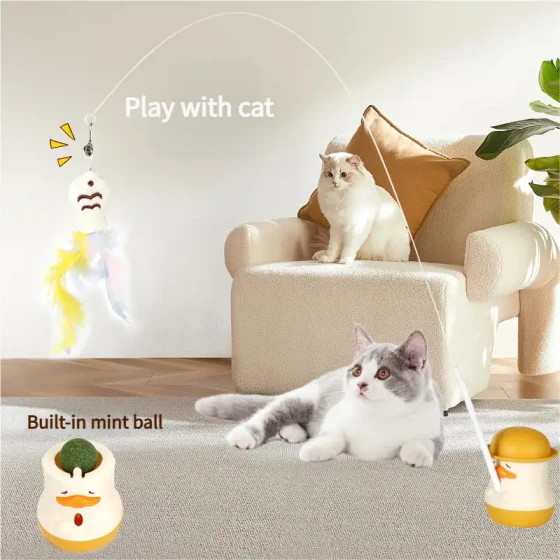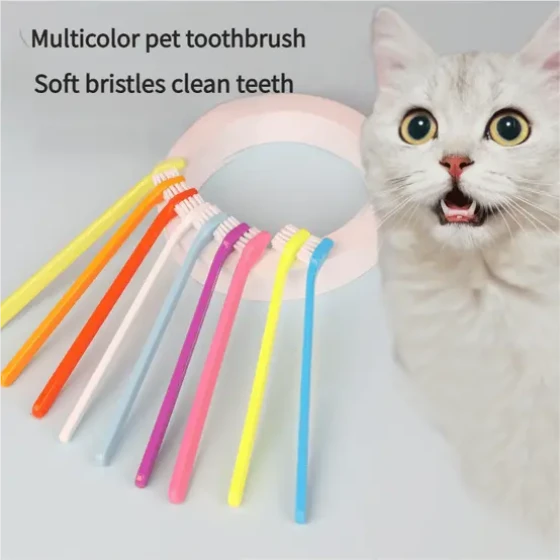What to Do If a Cat Keeps Coughing_Complete Analysis of Causes and Solutions for Cat Coughing
A cat constantly coughing worries many pet owners since cats cannot speak and only use body language to express discomfort. Simply put, a cat’s cough is like a human cough, a reflex caused by irritation in the respiratory tract. However, it is not a disease itself but a sign of potential underlying problems, requiring attention to identify the real “culprit.”

When your cat begins to cough frequently, it often means its respiratory system, from nose to lungs, may be facing some challenges. Understanding the causes of cat coughing is crucial as it helps assess the severity and determine when professional veterinary care is necessary.
What does a cat’s cough sound like?
A cat’s cough sounds different from a human’s. It generally manifests as a dry, retch-like sound, as if trying to expel something, sometimes accompanied by wheezing or difficulty breathing. Some cats lower their bodies and stretch their necks during coughing, appearing to exert much effort. This sound is often mistaken for vomiting hairballs, but careful observation shows that coughing usually does not expel anything (except in hairball-related coughing).
What are the common causes of cat coughing?
There are many causes for a cat’s cough. Some are common and easily treated, while others may indicate more serious health concerns.
- Hairballs
Cats are natural "cleaners" and spend considerable time grooming themselves. In this process, they inevitably swallow some hair. These hairs accumulate in the digestive tract and form hairballs. When hairballs irritate the esophagus or stomach, the cat tries to expel them through coughing and vomiting. This is one of the most common reasons for cat coughing, especially in long-haired cats. Hairball-induced cough usually presents as dry coughing and gagging, sometimes followed by vomiting the hairball. - Feline Asthma
This is a common chronic respiratory disease in cats similar to human asthma. The cat’s airways become inflamed, swollen, and constricted due to allergens or irritants (such as smoke, pollen, dust, perfume, or some clumping cat litter dust), causing breathing difficulty and coughing. During an asthma attack, cats may cough frequently, wheeze, breathe rapidly, or even breathe with an open mouth, appearing very distressed. Feline asthma cannot be cured but symptoms can be managed with medication. - Respiratory Infections
Viruses (like feline herpesvirus, calicivirus) or bacterial infections may cause inflammation in the upper or lower respiratory tracts, triggering coughing. Common symptoms besides coughing may include sneezing, nasal discharge, increased eye or nasal secretions, loss of appetite, and lethargy, somewhat like a severe cold in humans. Kittens, elderly cats, or immunocompromised cats are more susceptible. - Allergies
Besides triggering asthma, environmental allergens (such as dust mites, pollen, mold spores) can directly irritate a cat’s airways, leading to coughing. This usually is a seasonal or contact reaction. - Tracheitis or Bronchitis
Inflammation of the trachea or bronchi can be caused by infections, irritants, or allergies, resulting in coughing. Chronic bronchitis is a long-term inflammation that leads to persistent coughing. - Inhaled Foreign Objects
Though uncommon, cats may accidentally inhale small foreign bodies like grass seeds or small toy pieces while playing or eating, which irritate the trachea or bronchi and cause severe coughing. - Heartworm Disease
Heartworms primarily reside in the heart and lung vessels of cats. Although cats are not the typical hosts, infection can lead to serious respiratory and circulatory problems, with coughing as one of the symptoms, especially in early infection or when worms die. - Other Causes
Less common causes include pneumonia, pulmonary edema (usually related to heart disease), tumors (lung or those compressing airways), and pleural effusion.
When should you take your cat to the vet?
Occasional coughing, especially after grooming, might just be due to hairballs. However, if any of the following occur, make sure to see a veterinarian promptly:
- Coughing continues without stopping or becomes increasingly frequent.
- The sound or nature of the cough changes.
- Coughing is accompanied by difficulty breathing, wheezing, open-mouth breathing, or rapid breathing.
- The cat shows lethargy, loss of appetite, or weight loss.
- Additional symptoms such as sneezing, nasal discharge, eye or nasal secretions, fever, etc.
- Coughing affects the cat’s normal activity and rest.
Remember, only a professional veterinarian can accurately diagnose the cause of your cat’s coughing. Do not medicate your cat yourself or rely on folk remedies.
How do veterinarians diagnose cat coughing?
Vets will take a detailed history (including cough frequency, sound, duration, triggers), perform a thorough physical exam, and may recommend diagnostic tests to confirm the cause:
- Auscultation: Using a stethoscope to listen to the cat’s lungs and trachea to identify abnormal breathing sounds.
- X-rays: Chest X-rays can help evaluate the lungs, trachea, and heart size and shape, revealing inflammation, fluid, tumors, or foreign objects.
- Blood Tests and Biochemistry: Assess overall health status and exclude infections.
- Fecal Examination: To rule out parasitic infections like lungworms.
- Tracheoscopy or Bronchoalveolar Lavage: Using an endoscope under sedation or anesthesia to examine the trachea and bronchi and collect secretions for cytology and bacteriology.
- Heartworm Testing: Blood tests to exclude heartworm infection.
- Allergen Testing: If asthma from allergies is suspected, allergen testing may be required.
Approaches to Treating Cat Coughing
Treatment depends entirely on the diagnosed cause:
- Hairballs: Increase grooming frequency, feed hairball remedies or fiber-rich cat food to help expel hairballs.
- Respiratory Infections: Viral infections are mainly managed with supportive care to boost immunity; bacterial infections require antibiotics. Mucolytics or cough suppressants may be used as per vet advice.
- Feline Asthma: Managed primarily with medications such as corticosteroids (anti-inflammatory) and bronchodilators (to open airways), usually inhaled drugs with fewer side effects. Often requires long-term or lifelong treatment to control symptoms.
- Allergies: Identify and avoid allergen exposure whenever possible.
- Heartworm Disease: Treatment is complex and risky, usually supportive therapy to control symptoms. Prevention is more important than treatment.
- Foreign Objects: Removal via endoscopy or surgery is necessary.
Home Care and Prevention
Alongside veterinary treatment, home care can help speed recovery:
- Provide a quiet and comfortable environment: Avoid stress and strenuous activity.
- Maintain fresh air: Avoid smoking, perfumes, air fresheners, and other irritants at home. Use dust-free or low-dust cat litter.
- Control humidity: Appropriate humidity helps relieve respiratory discomfort.
- Encourage water intake: Hydration helps thin respiratory secretions.
- Regular grooming: Especially for long-haired cats, frequent brushing reduces hairball formation.
- Regular checkups and vaccinations: Prevent infectious diseases.
- Timely internal and external parasite control: Prevent respiratory problems caused by parasites such as heartworms.
Common Questions and Answers
- Is a cat’s cough just vomiting hairballs?
Not necessarily. While hairballs are a common cause, coughing in cats can signal various respiratory diseases and requires veterinary diagnosis. - Can I give my cat human cough medicine?
Absolutely not. Ingredients and dosages safe for humans can be toxic to cats. Only use cat-specific medications under veterinary guidance. - What if my cat coughs after eating?
This may be caused by eating too quickly, choking, esophageal issues, or food allergies. If frequent or accompanied by other symptoms, consult a vet. - How to distinguish cat coughing from vomiting?
Coughing is usually dry or retch-like, with a lowered body and extended neck, without necessarily expelling anything. Vomiting involves more obvious abdominal contractions and ultimately expels stomach contents.
Summary
Cat coughing is a symptom that should not be ignored. It can be caused by hairballs, respiratory infections, asthma, and more. Responsible pet owners must closely monitor their cat’s cough and associated symptoms. If coughing persists, worsens, or is accompanied by breathing difficulty, promptly take your cat to a professional veterinarian for diagnosis and treatment so your beloved cat can regain health and happily continue to snuggle and play by your side.




